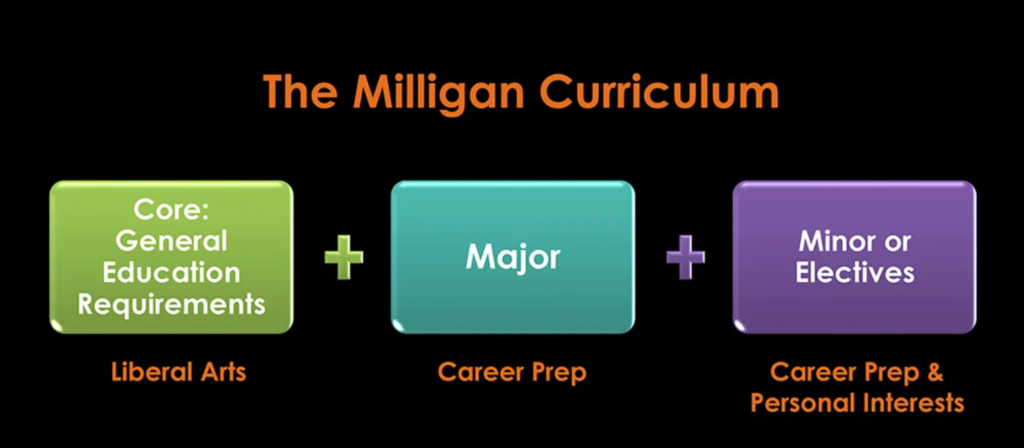The General Education Requirements (GER) Phase 3 Committee is developing a plan to repackage Milligan’s general education requirements to better serve students. The faculty meeting on Feb. 14 included an update on what has been discussed regarding GER.
Vice President of Academic Affairs and Dean Dr. Rich Aubrey said, “We have no intention to increase the hours of general education requirements.”
Instead, the committee aims to make the requirements more efficient. Aubrey said that if anything there will be a slight decrease.
Aubrey said a plan will soon go out to faculty for review.
President Bill Greer wants to be sure that Milligan’s GER requirements help students be prepared as 21st-century servant-leaders.
Greer read from an email he recently received from the CEO of Ballad Health, Alan Levine, who said that Ballad nurses who graduated from Milligan are among the “most prepared clinically and empathetically.”
“This example is a testament to Milligan’s mission to prepare students for service,” Greer said.
Greer said that part of what sets Milligan apart is its commitment to Christian liberal arts education, including its dedication to the Bible and its unique humanities program. He said this commitment needs to be in conjunction with teaching students skills to be relevant today.
“We can’t do one without the other,” Greer said.
Aubrey referred to the general education requirements at East Tennessee State University, where students are required to take 15 credit hours of humanities, fine arts, and history courses. The ETSU catalog lists these, among others, as general education requirements: 3 credits of literature, 3 credits of fine arts, 3 credits of humanities electives, and 6 credits of history.
Aubrey believed the important difference is that Milligan has 16 integrated credit hours rather than five courses that are distinct from each other.
The program may cause some challenges with scheduling and advising, but the integrated model allows for a nuanced discussion of big ideas, something Aubrey said is a timely skill to have.
Both Aubrey and Greer said Milligan needs to better communicate the value of its liberal arts education for students.
“We have to get better at telling students why it is important,” Aubrey said about liberal arts education. “Why it enhances their career preparation and their growth as people.”
In addition to the current Phase 3 Committee, there are plans being considered to form a standing GER committee that would involve rotating members.
“[We are] very excited because of the potential benefit to students,” Aubrey said.
The meeting also included proposed adjustments for other undergraduate programs. The following is a summary of faculty-proposed adjustments:
- Modification of the Exercise Science major to include modification of minors in Coaching, Exercise Science and Fitness & Wellness (Dr. Melinda Collins)
- Collins said the modification is in response to a lack of relevance for physical education.
- Being a modification of a program, it required the one reading of the proposal and faculty vote.
- It was unanimously approved.
- New Sports Management major and minor (Dr. Melinda Collins)
- Being an addition of a program, it requires a first reading, a second reading, and faculty vote.
- The second reading and faculty vote will take place during the March meeting.
- Modification of the Social Work major and minor (Professor Stacey Kastens)
- Kastens said that the courses offered will be modified for two reasons: 1. The program is seeking accreditation which requires certain adjustments. 2. The courses will better align with the expertises of faculty in the program.
- Being a modification of a program, it required the one reading of the proposal and faculty vote.
- It was unanimously approved.
- Deletion of Social Innovation and Design minor (Professor Stacey Kastens)
- Being a deletion of a program, it requires a first reading, a second reading, and faculty vote
- The second reading and faculty vote will take place during the March meeting.
Headling Image from Milligan University

